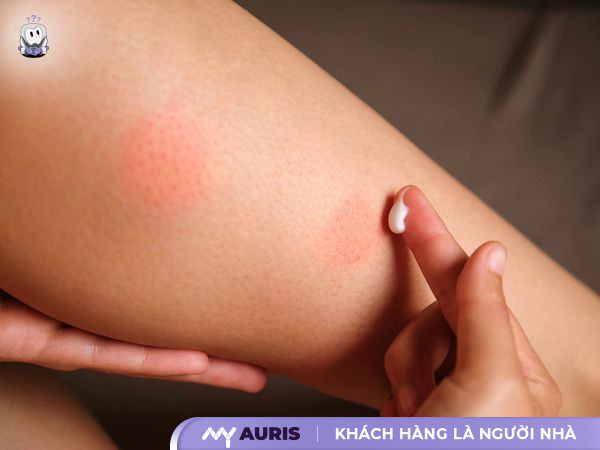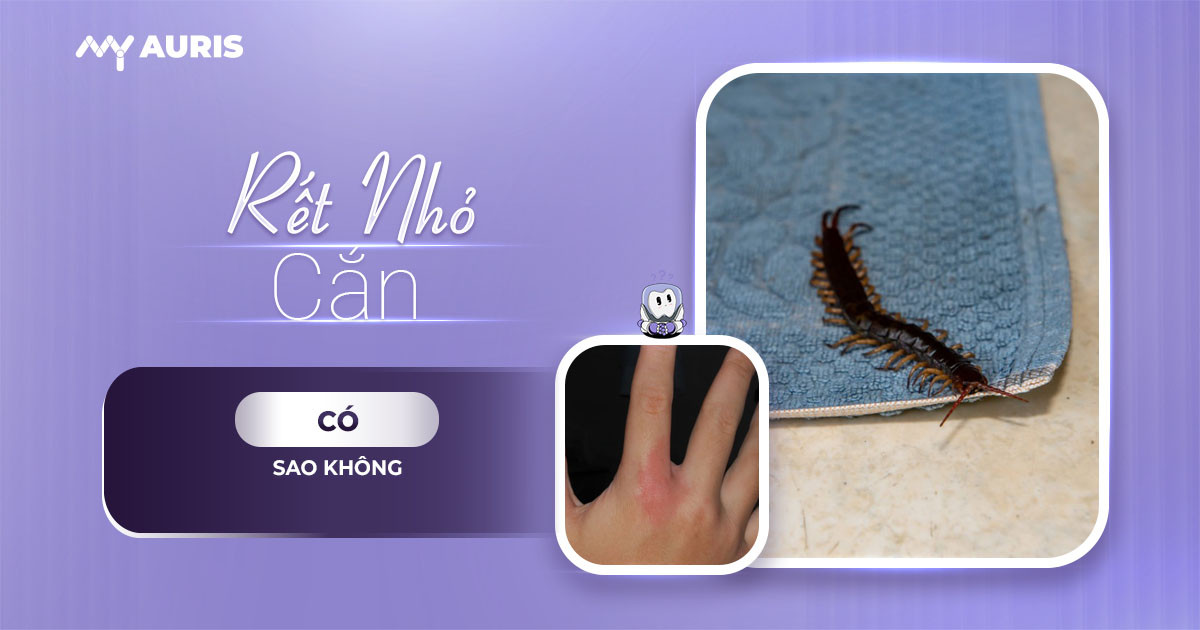Are you worried about small centipedes crawling around your house? Are they venomous and dangerous to your family? Many people are confused, wondering if small centipedes in the house are venomous and how to deal with a bite. My Auris will answer these questions, helping you understand more about this arthropod.
Signs of a Centipede Bite Requiring Immediate First Aid
Below are the signs that require immediate first aid after a centipede bite:
Local Symptoms
A centipede bite usually causes immediate pain. Sharp, burning pain is a common symptom. The skin around the bite swells and reddens, and blisters may appear. In some cases, the bitten area may turn purple. The size of the swelling depends on the centipede species, venom, and the body’s reaction. If bitten by a centipede, pain and swelling symptoms may appear. The bite can cause itching and discomfort. Closely monitor changes in the bite for timely treatment. Proper handling of the bite can minimize harm. Small centipedes can be venomous.
Systemic Symptoms
In addition to local symptoms, a centipede bite can cause systemic symptoms. Some people experience mild fever and chills after being bitten. Nausea and dizziness are also symptoms to note. In cases of allergic reaction, the bitten person may experience difficulty breathing and hives. Allergic reactions to centipede venom can be life-threatening.

Is a Centipede Bite Dangerous?
Centipede venom contains toxins that cause pain, swelling, redness, and sometimes allergic reactions. Centipedes are invertebrates belonging to the arthropod group. However, not all centipede species are equally dangerous. The toxicity of a bite depends on the species, the size of the centipede, the amount of venom injected, and the individual’s immune system reaction. Most small house centipedes are relatively harmless, and their bites only cause localized pain, similar to a bee sting or ant bite. Centipede bite symptoms typically include localized pain, swelling, and redness. In some cases, fever, nausea, and dizziness may occur.
What are the characteristics of small house centipedes?
Centipedes belong to the invertebrate group, phylum Arthropoda. House centipedes are usually small, with flattened bodies divided into many segments. Each segment has a pair of legs. The number of legs varies by species, typically from 15 to 177 pairs. Their color is usually pale yellow, brown, or gray. They move quickly and prefer dark, humid environments. These creatures often seek shelter in houses in cracks, under cabinets, bathrooms, and other high-humidity areas. Centipedes are carnivorous, hunting insects, spiders, and cockroaches. This is a benefit as they help control pest insects in the house. However, the bite of a small centipede can still cause pain, swelling, and allergic reactions in some people.

Are small house centipedes venomous?
While most small house centipedes are benign, some species can still inject venom through their fangs. This venom can cause allergic reactions, pain, and swelling at the bite site. In some individuals, reactions after a centipede bite can be more severe, affecting the nervous system, immune system, and skin. If bitten by a centipede, pain and swelling symptoms may appear. The toxicity of a centipede depends on its species and size. Timely treatment can minimize the harm from the bite.
First Aid for Small House Centipede Bites
Step 1: Clean the Bite
Thoroughly wash the bite with soap and water. Invertebrates like small centipedes often carry bacteria. Cleaning the bite helps prevent infection. Clean water removes toxins, reducing inflammatory reactions.
Step 2: Apply a Cold Compress
Apply a cold compress to the bite. A cold pack or an ice bag wrapped in a thin cloth helps reduce pain and swelling. Cold constricts blood vessels, limiting the spread of the creature’s toxins. Apply for 15-20 minutes at a time, repeating every few hours.
Step 3: Use Pain Relievers
Over-the-counter pain relievers like ibuprofen or paracetamol help reduce pain and fever. Follow the dosage instructions on the package. If pain is severe, consult a doctor.
Step 4: Monitor Centipede Bite Symptoms
Observe the bite. Small centipedes, though generally harmless, can still cause allergic reactions in some individuals. Severe allergic reactions can affect the respiratory and circulatory systems. Symptoms such as difficulty breathing, facial swelling, or nausea require immediate emergency care.
Step 5: Seek Medical Attention if Necessary
If centipede bite symptoms do not subside or worsen, consult a doctor. The doctor will assess the danger level and prescribe appropriate treatment. Timely treatment helps minimize harm and prevent complications.

How to Prevent Small Centipedes in the House
Centipedes prefer humid environments. Reducing humidity in the house is the first and most important step. Start by repairing water leaks from pipes, faucets, or the roof. Ensure good ventilation in the kitchen and bathroom. Use a dehumidifier if necessary. Dryness is the enemy of centipedes.
Regular house cleaning is an effective way to prevent centipedes. Remove piles of clutter, paper scraps, rotten wood, and leaves around the house. These are ideal hiding spots for centipedes and other insects. Keeping your home tidy and clean will limit their hiding places.
Centipedes can squeeze through small gaps. Sealing cracks and crevices in walls, windows, and doors is a way to prevent their entry. Use silicone sealant or insect screens to seal these openings.
Centipedes are insectivorous invertebrates. By eliminating their food source, you will indirectly drive centipedes out of your house. Control other insects such as cockroaches, spiders, and ants.
Some natural remedies can help repel centipedes. Diatomaceous earth is a safe and effective option. Sprinkle diatomaceous earth along baseboards, under cabinets, and in areas where centipedes often appear. Peppermint, green tea, and lavender essential oils also have repellent effects. Drop a few drops of essential oil onto cotton balls and place them in areas centipedes frequent.
In summary, small centipede bites are generally benign and rarely dangerous. However, if unusual symptoms appear, such as severe swelling and pain, difficulty breathing, or nausea, seek medical attention immediately. Do not self-treat. For greater peace of mind regarding your health, you can consult a doctor.





